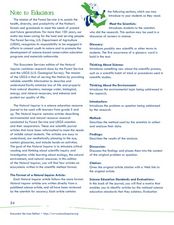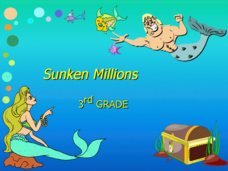Curated OER
Digging Up Dino Data
Third graders use the Internet to research a specific dinosaur. They work in pairs and individually to browse dinosaur websites, take notes on pertinent information, write, edit and illustrate reports. They post their work.
Curated OER
Let's Get it Together! Reading to Learn
Let’s learn about frogs! Young readers are led through “Freaky Frogs,” a non-fiction article. Teach learners how to edit an article so there are fewer details to sift through. After talking through the article, they learn the six steps...
Curated OER
3A is Going Batty
Students share their knowledge of bats. In this video production instructional activity, students use Internet and print resources to research information regarding bats. Students prepare bat questions and answers, record them on video,...
Curated OER
Planets for Sale
Student develop their technology skills. In this solar system lesson, 3rd graders create a movie featuring planets that they research. Students use flip video cameras to film commercials to market their planets.
Curated OER
Natural Inquirer Ecosystem Article Lesson
Students discover new ways to preserve the ecosystem by completing graphic organizers. In this environmental activity, students read an article from the Natural Inquirer in small groups and fill out a graphic organizer based on the...
Big Kid Science
Photographing the Eclipse Tips and Tricks Guide
Use a guide that provides safe ways for viewing the eclipse with a camera or telescope. The guide also includes tips and tricks for getting the best shot using a camera phone or SLR camera. You won't wanna miss this!
Curated OER
Green Plants
Beginning botanists are introduced to the world of plants with this PowerPoint. Some of the information is most appropriate for primary learners, such as the needs of a plant. Some of the information, however, is more directed at...
Curated OER
Animal Adaptations
Young scientists explore the animal kingdom from the safety of the classroom with this short research project. After first choosing an animal, children use the Internet to discover where it lives, what it eats, and how it has adapted to...
Jessica Winston
Tacky and the Winter Games
Helen Lester's wonderfully wacky, Tacky and the Winter Games, is the core text featured in a resource packet that includes a prediction exercise, an activity menu, vocabulary flash cards, and book review worksheet. A great way to cheer...
Class Antics
Leap Year: Write a Newspaper Article
Extra! Extra! Read all about leap year! Here, scholars write a newspaper article all about leap year/leap day from given facts including who, what, where, when, and why.
Center for Learning in Action
Introduction to Matter
Begin your states of matter lessons with a demonstration designed to introduce the concept that all matter has properties. Reinforce this concept through vocabulary exploration, and the creation of atom models; salt, water, and carbon...
Center for Learning in Action
Introduction to the States of Matter
Liquids, gases, and solids are the states of matter in which scholars investigate in a lesson plan that offers in-depth information and engaging activities that look into the three states and the changes their properties make when mixed...
Center for Learning in Action
Density
Explore the concept of density within states of matter—gases, liquids, and solids—through a group experiment in which young scientists test objects' texture, color, weight, size, and ability to sink or float.
Center for Learning in Action
Gases
Explore the properties of gases through one activity and two investigations in which super scientists observe the changes gas makes when encountering different conditions.
Center for Learning in Action
Challenge with Solids, Liquids, and Gases
There's a container for every matter—liquid, solid, and gas. Pupils design three different containers, each with the capability to hold one of the states of matter, and share their design with the class.
Center for Learning in Action
Water—Changing States (Part 1)
Here is part one of a two-part lesson in which scholars investigate the changing states of water—liquid, solid, and gas. With grand conversation and up to three demonstrations, learners make predictions about what they think will happen...
Center for Learning in Action
Introducing Physical and Chemical Changes
Young scientists investigate chemical and physical changes to the states of matter—gas, liquid, and solid—as well as solutions and suspensions with a variety of demonstrations, grand conversation, and an interactive quiz to check for...
Center for Learning in Action
Water – Changing States (Part 2)
Here is part two of a two-part lesson in which scholars investigate the changing states of water—liquid, solid, and gas—and how energy from heat changes its molecules. With grand conversation, two demonstrations, and one hands-on...
Center for Learning in Action
Investigating Physical and Chemical Changes
Super scientists visit ten stations to predict, observe, and draw conclusions about the physical and chemical changes that occur when different states of matter—liquid, solid, and gas—are placed under a variety of conditions. To...
Scholastic
Organization Outline
Forming a strong organizational outline is important when reading a complex text, writing an informative essay, or analyzing a complicated problem. Use a straightforward organization outline to teach learners about concept mapping.
Floyd County Schools
Who Is Hibernating?
Young scientists explore the wintertime behavior of common animals with this presentation on hibernation. Offering clear explanations about the who, what, where, when, and why regarding hibernation, this resource is perfect for primary...
Curated OER
Sunken Millions: 3rd Grade
In this PowerPoint, students participate in a game with a quiz show format in which they answer questions about water. Topics include the water cycle, bodies of water, characteristics of water, and how water relates to weather...
Curated OER
Wet or Dry Experiment
Practice the scientific process by testing whether mealworms prefer a wet or dry environment. This is an engaging experiment to use as an example of how to go through the steps of the scientific method. Elementary schoolers can work in...
Baylor College
Food Webs
Explore various ecosystems from around the world as your class discovers the interdependence of all living things. Using the provided sets of ecosystem cards, young scientists work in small groups building food webs to demonstrate the...
Other popular searches
- Editing Paragraphs
- Revising and Editing
- Peer Editing
- Paragraph Editing Practice
- Proofreading and Editing
- Photo Editing
- Editing Checklist
- Editing Marks
- Paragraph Editing
- Peer Editing Checklist
- Peer Review
- Self Editing

























